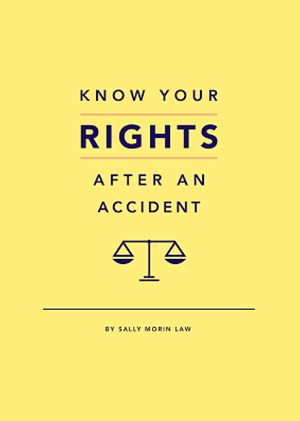Navigating the Aftermath: San Francisco Car vs Motorcycle Accident Settlement Process
Accidents are a chilling reality of our daily lives, but when it comes to a San Francisco car vs motorcycle accident, the stakes escalate significantly. Understanding the settlement process in this city is crucial as it can drastically impact your journey to recovery.
The Risks Faced by Motorcyclists
Motorcyclists bear a higher risk of severe injuries in accidents compared to car drivers. In 2020 alone, the fatality rate per 100 million vehicle miles traveled was dramatically higher for motorcycles (30.68) than cars (1.34). This stark contrast underscores the vulnerability of motorcyclists – their smaller size and lack of protection often lead to devastating consequences.
The Challenges Faced by Motorcyclists in Seeking Compensation
The aftermath of such accidents also presents an uphill battle for motorcyclists seeking fair compensation. From bias against riders to complex legal procedures, these challenges make navigating the settlement process a daunting task. A strong grasp of this process could be instrumental in overcoming these hurdles and reclaiming your life post-accident.
In this article, we will delve into the intricacies of San Francisco’s car vs motorcycle accident settlement process – providing insights that empower you to fight for your rights effectively. Armed with this knowledge, you stand a better chance at securing the compensation you rightfully deserve, mitigating both physical pain and financial strain.
The Settlement Process Explained
Comprehending the San Francisco car vs motorcycle accident settlement process is pivotal for victims seeking justice. This knowledge empowers them to navigate their path to compensation with confidence. The process, though seemingly daunting, can be broken down into manageable steps.
Step 1: Accident Reporting
Initiating the settlement process involves reporting the accident to law enforcement authorities and your insurance company as soon as possible. It’s crucial to provide a detailed account of the incident, which forms an integral part of your claim.
Step 2: Evidence Gathering
Collecting evidence at the scene is the next step. This includes photographs of damages and injuries, witness statements, and any other pertinent information that can support your claim.
Step 3: Medical Consultation
Seek immediate medical care after an accident, regardless of apparent injury severity. Some conditions manifest symptoms days or weeks later. Medical reports serve as vital evidence, linking injuries directly to the accident.
Step 4: Legal Consultation
Retaining legal representation is advisable at this stage. Attorneys experienced in motorcycle accidents understand how to navigate the complexities of such cases effectively. They also offer invaluable advice on documenting expenses and losses related to the accident.
Step 5: Claim Filing
Your attorney will help draft and submit a comprehensive claim to the at-fault party’s insurance company. This claim outlines liability details and specifies exact compensation sought for damages sustained.
Step 6: Negotiation Phase
During this phase, attorneys engage with insurance adjusters over settlement amounts. If negotiations yield unsatisfactory results, your attorney may recommend proceeding to trial.
Step 7: Litigation
Few cases reach this stage, but when they do, your attorney presents your case before a jury or judge who determines final compensation awards.
Understanding these steps demystifies the San Francisco car vs motorcycle accident settlement process.
Understanding Liability in Car vs Motorcycle Accidents
Determining who is at fault in a car versus motorcycle accident often depends on how negligence and adherence to traffic laws are handled within California’s legal framework. In these cases, establishing liability is a complex task that requires a thorough investigation into the actions of each party involved in the collision.
Factors Affecting Liability
There are two main factors that affect liability in car vs motorcycle accidents:
- Negligence: This refers to a failure to behave with the level of care that someone of ordinary prudence would have exercised under the same circumstances. In vehicular accidents, negligence can include things like disobeying traffic signals, speeding, or not paying attention to the surroundings.
- Traffic Laws: Specific California traffic laws also play a role in determining liability. When these laws are broken, it becomes clearer who is responsible for the accident. Examples include violating rules about right-of-way or lane splitting.
Common At-Fault Scenarios
Here are some common scenarios where either the car driver or the motorcyclist may be at fault:
- Car Driver Fault: Car drivers may be found liable for accidents involving motorcycles due to:
- Failure to yield right-of-way, especially during turns
- Distracted driving, including phone use while driving
- Impaired driving, such as driving under the influence of marijuana
- Opening car doors without checking for oncoming motorcyclists
- Motorcyclist Fault: On the other hand, motorcyclists might be held accountable when they:
- Lane split unsafely or illegally
- Speed excessively or ride recklessly
- Ignore traffic signs or signals
- Ride while impaired or unfit
Remember, each accident is unique and requires careful examination of the circumstances. Gathering evidence such as camera footage, eyewitness accounts, and police reports is crucial to understanding what happened.
In some cases, both parties may share responsibility under California’s comparative fault rule. This means that compensation can be adjusted based on each party’s degree of fault. If you’re involved in a car vs motorcycle accident in San Francisco, it’s important to consult with a lawyer who specializes in these types of cases and can navigate the legal complexities effectively.
Understanding liability is just one part of building a strong case and seeking fair compensation for those affected by such traumatic events.
2. Building a Strong Case with Evidence
Effective claim resolution in car vs motorcycle accident cases hinges on the strength of evidence presented. With the correct pieces of evidence, motorcyclists can solidify their stance, refute bias, and secure fair compensation for injuries sustained.
Photos: Indispensable to motorcycle accident cases in San Francisco, California
Photos can visually narrate the accident’s details and provide insights into accident causality and fault determination. Capture clear images of:
- Accident scene, depicting road conditions, traffic signs, and vehicle positions.
- Injuries sustained and property damage incurred.
- Skid marks or any debris that could indicate pre-collision movements.
Witness Statements: Reinforcing your claim’s authenticity
Witnesses offer an unbiased third-party perspective of the incident, reinforcing your claim’s authenticity. Seek statements from:
- Bystanders who observed the accident.
- Passengers from involved vehicles.
- Any first responders at the scene.
Each unique account fortifies your version of events and helps establish liability.
Medical Records: Substantiating your injury claims
Medical documentation validates your physical suffering and forms a substantial part of your claim. Important records include:
- Initial injury assessment conducted post-accident.
- Detailed medical reports illustrating injury severity and treatment plans.
- Receipts for all medical-related expenses (hospital bills, medication costs, physical therapy sessions).
These records substantiate your injury claims and justify demands for compensation relating to medical expenses.
Police Reports: Providing vital information for settlement discussion
Law enforcement officers attending the accident scene generate an official report detailing their observations. This report often includes their opinion regarding fault—vital information for any settlement discussion.
Traffic Surveillance Footage: Potentially providing indisputable evidence
If available, traffic camera recordings or nearby security footage could provide indisputable evidence about the accident dynamics.
In essence, strategic evidence compilation enhances credibility and persuades insurance adjusters about your claim’s validity. However, collating such extensive evidence single-handedly amidst physical discomfort and emotional turmoil can prove challenging. Hence, consider enlisting experienced attorneys who are well-versed in evidence gathering to build an irrefutable case for your rightful compensation.
3. How Damages are Calculated for Injuries and Losses in Car vs Motorcycle Accidents
When determining the amount of compensation you may receive in a car versus motorcycle accident settlement, it’s important to understand the various categories of damages that may apply. In San Francisco and throughout California, individuals who have sustained injuries in these types of accidents may be entitled to different forms of compensation.
Types of Damages in Car vs Motorcycle Accident Settlements
Here are the main types of damages that are typically considered in car versus motorcycle accident settlements:
- Medical Expenses: This includes all expenses related to medical treatment for your injuries, such as hospital bills, surgeries, medications, rehabilitation sessions, and other necessary healthcare services. It’s important to note that future medical costs can also be included in this category if you require ongoing care due to the accident. If you’re interested, you can watch a video on medical liens which Sally Morin Law has discussed extensively.
- Lost Wages: If your injuries have caused you to miss work or have resulted in a decrease in your ability to earn income in the future, you may seek compensation for the wages you have lost or will potentially lose.
- Pain and Suffering: These are non-economic damages that encompass physical pain, emotional distress, loss of enjoyment of life, and mental anguish experienced as a result of the accident. Calculating the value of pain and suffering can be complex and often requires legal expertise to ensure all aspects of your suffering are properly accounted for.
- Property Damage: In cases where your motorcycle has been damaged or destroyed due to the accident, you may be eligible to receive compensation for the costs of repairing or replacing your vehicle.
Determining Your Eligibility for Damages
It’s important to remember that every case is unique, and the specific types of damages available to you will depend on the details of your situation. Consulting with an experienced attorney who specializes in personal injury cases can help you navigate the complexities of calculating potential damages and ensure that no potential areas for compensation are overlooked.
When assessing potential damages, it’s essential to aim for not just financial recovery but also fair compensation that adequately reflects the impact of the accident on your life. An attorney can provide valuable guidance in this process and work towards securing a settlement that meets your needs.
4. Tips for Negotiating with Insurance Companies after a Motorcycle Accident
Dealing with insurance companies after a motorcycle accident can be overwhelming, especially when you’re already dealing with physical and emotional challenges. But knowing how to handle insurance negotiation can make a big difference in getting a fair motorcycle accident settlement. Here are some tips to help you navigate this process:
How Insurance Negotiation Works
The first step in the negotiation process is sending a demand letter to the insurance company, which outlines the details of the accident, your injuries, medical treatments, lost wages, and other damages. Once they receive this letter, an adjustor will be assigned to evaluate your claim. Keep in mind that their goal is to minimize the company’s payout as much as possible.
Strategies for Stronger Negotiations
To strengthen your position during these negotiations, consider the following strategies:
- Be Prepared: Take time to understand every aspect of your case, including the accident itself, your injuries, and financial losses. This knowledge will help you confidently address any questions or challenges from the adjustor.
- Don’t Rush: It’s common for insurance companies to start with a low initial offer. Be patient and willing to reject inadequate offers while waiting for a more reasonable one.
- Document Everything: Keep detailed records of all interactions with the insurance company, including phone calls, emails, and letters. This documentation will come in handy if there are any discrepancies or disputes later on.
- Stick to Facts: When discussing your damages, focus on objective information rather than emotional appeals. Adjustors base their decisions on facts and figures, so presenting clear evidence is crucial.
- Consider Legal Representation: If you’re feeling overwhelmed or unsure about handling negotiations on your own, it may be beneficial to consult with an experienced attorney who specializes in motorcycle accident cases. They can guide you through the process, counter adjustor tactics, and work towards maximizing your settlement amount.
Stay Confident and Seek Help if Needed
Facing an insurance company can be daunting, but remember that you have rights as a victim of a motorcycle accident. By staying informed, being patient, and seeking professional advice when necessary, you can increase your chances of achieving a fair resolution.
5. The Role of Attorneys in Car vs Motorcycle Accident Settlements
Navigating a car vs motorcycle accident settlement is no simple feat. It’s a process that demands a comprehensive understanding of local laws, negotiation skills, and a keen eye for detail in gathering and presenting evidence. Experienced personal injury attorneys, such as the team at Sally Morin Personal Injury Lawyers, play an invaluable role in this context.
Expert Assistance with Case Preparation
- Motorcycle accident lawyers are well-versed in personal injury law and can collect and analyze critical evidence.
- They help victims build strong cases by establishing liability through robust evidence.
- Attorneys conduct thorough reviews of police reports, interview witnesses, and consult with experts to ensure no stone remains unturned.
In-depth Knowledge of Jurisdiction
San Francisco has its unique set of traffic laws and regulations. Hence, working with local attorneys who have extensive knowledge of these rules can be instrumental in winning your case. A car vs motorcycle accident lawyer from San Francisco will not only be familiar with the city’s roadways but also understand how its courts operate.
Negotiation Tactics
Insurance companies are notorious for offering low initial settlement amounts to victims. Skilled attorneys can use their negotiation prowess to counter these tactics effectively. They have an acute understanding of what a fair settlement looks like and won’t hesitate to take the case to court if necessary.
Legal Representation
In addition to negotiation, attorneys represent their clients in court proceedings if a satisfactory agreement cannot be reached out-of-court. They prepare compelling arguments that emphasize their client’s rights and fight tirelessly for just compensation.
In summary, a seasoned car vs motorcycle accident lawyer can be an invaluable asset in San Francisco settlements. They bring knowledge, experience, and a strategic approach to the table, greatly enhancing the prospects of a successful outcome.
Seeking Medical Care and Legal Assistance After a Car vs Motorcycle Accident
Immediate medical treatment after a motorcycle accident can mean the difference between a swift recovery and prolonged complications. For motorcyclists navigating the streets of San Francisco, the aftermath of an accident is not just about physical healing but also about ensuring legal rights are protected. Here’s why prompt action in both medical and legal fronts is crucial:
Why Immediate Action Matters
1. Medical Urgency
Motorcycle accidents can lead to serious injuries, some of which may not be immediately apparent. Early diagnosis and treatment are vital to prevent long-term consequences.
2. Documentation
Medical records serve as critical evidence in personal injury cases. Beginning medical care immediately creates a documented timeline of your injuries, which is invaluable during the claims process.
3. Legal Timeliness
The sooner you seek legal guidance, the quicker you can navigate the complexities of insurance claims with confidence. A San Francisco personal injury attorney understands local laws and can safeguard your interests from day one.
How We Can Help
For those seeking to balance recovery with the demands of a legal claim, our firm provides compassionate and competent representation. To alleviate concerns about time commitment, we offer a straightforward approach designed to minimize your stress while handling your personal injury insurance claim.
Should you find yourself in need of guidance after an accident, contact us at (Clickable Phone Number) for a free case evaluation. Our team stands ready to help you reclaim your life post-accident with diligent advocacy and personalized support.
Common Injuries in Car vs Motorcycle Accidents
When a motorcycle collides with a car, the motorcyclist often bears the brunt of the impact. Without the protective shell that cars provide their occupants, individuals on motorcycles face exposure to direct contact with vehicles and roads. Consequently, the common injuries in motorcycle accidents can be more severe and numerous.
1. Head and Brain Injuries
Helmets reduce the risk of death by 37% and head injury by 69%, yet head and brain injuries are still prevalent among motorcyclists. These can range from concussions to traumatic brain injuries (TBIs), which might lead to long-term cognitive issues or disabilities.
2. Spinal Cord Injuries
The force exerted on the body during an accident can be devastating to the spinal cord. Such trauma may cause partial or complete paralysis, which dramatically changes one’s way of life and necessitates ongoing medical care.
3. Road Rash
Skidding across pavement can result in road rash—severe abrasions that can cause not only intense pain but also susceptibility to infections and potential for permanent scarring if not properly treated.
4. Lower Extremity Injuries
Legs and feet are particularly vulnerable in motorcycle accidents. Fractures, ligament damage, and even amputations occur, affecting mobility and quality of life.
5. Upper Body Injuries
Riders often instinctively throw out their arms to break a fall, leading to broken bones, shoulder dislocations, or nerve damage in the arms and hands.
Recognizing these risks highlights the critical need for protective gear such as helmets, reinforced jackets, gloves, and proper footwear when riding. Riders must practice situational awareness to mitigate these dangers, though even the most cautious motorcyclists are not immune to accidents caused by others’ negligence on the road.
The aftermath of an accident is a crucial time for motorcyclists. Addressing injuries promptly ensures better recovery outcomes while also providing documentation that is vital for any subsequent legal action taken against negligent parties. It’s essential not just for recovery but also for securing justice after an unfortunate incident on San Francisco’s busy streets.
The Ongoing Battle Against Bias: Overcoming Prejudice Towards Motorcyclists
Prejudice against motorcyclists is an unfortunate reality that can potentially hinder the settlement process following an accident. This bias often stems from stereotypes that paint motorcyclists as reckless or dangerous, which is not representative of the wider riding community.
It’s essential to understand how this bias can influence every stage of the settlement process. From police reports to insurance claims, these prejudices could impact the perception of liability and the valuation of damages.
Police Reports and Bias
Firstly, police reports play a significant role in determining fault in a car vs motorcycle accident. However, police officers are not immune to societal prejudices and may inadvertently lean towards blaming the motorcyclist. For instance, if a car driver was speeding but hit a motorcyclist performing a legal lane-splitting maneuver, some officers might focus more on the latter due to inherent bias.
Insurance Adjusters and Prejudiced Evaluations
Similarly, insurance adjusters may harbor biases that can affect their evaluation of a claim. They might underestimate the severity of injuries sustained by motorcyclists or downplay the level of trauma experienced. This could lead to lower settlement offers that are not reflective of the true losses suffered by motorcyclists.
Overcoming Bias in Court
If a case proceeds to court, biases can further complicate matters. Juries may hold preconceived notions about motorcyclists, which could influence their judgment on liability and damages. However, knowledgeable attorneys can counteract these biases by presenting clear and compelling evidence that paints an accurate picture of the accident.
Addressing Bias with Legal Representation
Engaging an experienced personal injury attorney is crucial in effectively handling these biases. Attorneys understand how to navigate through the prejudice against motorcyclists and present a strong case that underscores your right to fair compensation.
In essence, overcoming prejudice towards motorcyclists is a crucial part of the settlement process. It requires a comprehensive, objective understanding of the accident, reinforced by robust evidence and strong legal representation.
Conclusion
Navigating the aftermath of a car vs motorcycle accident in San Francisco can be challenging, but understanding the settlement process is crucial. From determining liability to negotiating with insurance companies, each step is integral to securing fair compensation.
By seeking the help of experienced legal representation like Sally Morin Personal Injury Lawyers, you equip yourself with a team dedicated to your case. The value of this expertise cannot be overstated. Your next step? Reach out for a free and confidential case evaluation to find out how long your injury case might take.
Choosing our firm comes with multiple benefits:
- Over $100 million recovered for clients throughout California
- Consistent 5-star reviews from satisfied motorcycle accident victims
- In-depth local expertise in San Francisco car vs motorcycle accident cases
Whether you are dealing with severe injuries or facing prejudices as a motorcyclist, know that you are not alone. Let us handle the legal complexities so you can focus on healing. Together, we can navigate this journey and reclaim your life post-accident.











